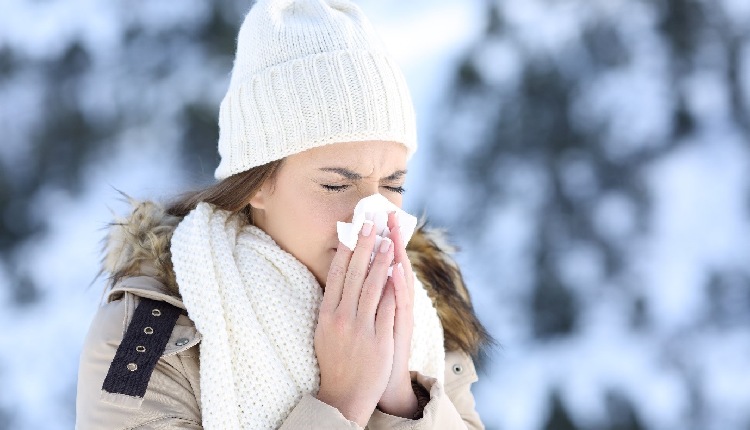Introduction: The importance of winter health
Welcome to the winter wonderland! As we gear up for cosy nights by the fireplace and hot cocoa in hand, it’s important to remember that this season brings more than just holiday cheer. Winter also comes with its own set of challenges when it comes to our health. The cold temperatures, dry air, and reduced sunlight can have a profound impact on our well-being if we are not careful. But fear not! With a little extra care and attention, you can keep yourself in tip-top shape throughout the chilly months ahead. In this article, we will explore some practical tips and expert advice on how to take care of your health during winter so that you can embrace all the joys this season has to offer without sacrificing your well-being. So grab a warm blanket and settle in and let’s dive right into it!
Understanding the impact of winter on our health
Winter is a beautiful season filled with cosy nights by the fire, hot cocoa, and festive celebrations. However, it’s important to understand that winter can also have an impact on our health. The colder temperatures and shorter daylight hours can affect both our physical and mental well-being.
The drop in temperature during winter can make us more susceptible to respiratory infections such as colds and flu. This is because viruses thrive in lower humidity levels which are common during this time of year. Additionally, spending more time indoors and in close proximity to others increases the likelihood of spreading these illnesses.
Moreover, the lack of sunlight during winter months can lead to vitamin D deficiency. Sunlight exposure helps our bodies produce vitamin D which plays a crucial role in bone health and immune function. Without sufficient levels of vitamin D, we may be at a higher risk for conditions like osteoporosis or weakened immunity.
Furthermore, winter weather often means staying bundled up indoors with heaters cranked up high. While this may keep us warm and comfortable, it can also lead to dry skin due to decreased moisture in the air. Dry skin not only feels uncomfortable but can also become cracked or irritated if left untreated.
In addition to physical impacts on health, winter can also have an effect on mental well-being. Seasonal Affective Disorder (SAD) is a type of depression that occurs during specific seasons – typically winter – due to reduced sunlight exposure. Symptoms include low mood, fatigue, loss of interest in activities previously enjoyed, and changes in appetite or sleep patterns.
Overall, it’s important for us to be aware of how winter affects our health so that we can take necessary precautions.
It’s essential to maintain good hygiene practices like washing hands frequently and avoiding close contact with sick individuals.
Additionally, to combat vitamin D deficiency, supplementing with appropriate dosages under medical guidance can help.
Also, nourishing our skin with moisturisers and drinking plenty of water will combat dryness.

Tips for maintaining a strong immune system during winter
As the winter season approaches, it’s important to take extra care of our immune system. With the cold weather and frequent exposure to germs, our bodies are more susceptible to illnesses. Here are some tips on how to maintain a strong immune system during this time:
1. Eat a balanced diet: Make sure your meals include plenty of fruits and vegetables that are rich in vitamins and antioxidants. These nutrients help support your immune system, keeping you healthy.
2. Stay hydrated: Drinking enough water is crucial for maintaining overall health, including a strong immune system. Aim for at least 8 glasses of water per day.
3. Get enough sleep: Sleep is essential for repairing and rejuvenating your body. A lack of sleep weakens the immune system, making you more prone to catching viruses.
4. Exercise regularly: Physical activity not only helps strengthen your muscles but also boosts your immunity by increasing blood circulation and promoting better lymphatic flow.
5. Manage stress levels: High stress levels can weaken the immune system over time. Find healthy ways to manage stress such as practicing mindfulness techniques or engaging in hobbies you enjoy.
6. Wash hands frequently: Good hygiene practices like washing hands with soap and water regularly can prevent the spread of germs and reduce illness risk.
7. Take supplements if necessary: If you have an underlying deficiency or medical condition that affects your immunity, consult with a healthcare professional about appropriate supplements to support your immune function in the winter months.
Remember, taking small steps towards maintaining a strong immune system can go a long way in keeping you healthy throughout the winter season!
Nutritional advice for staying healthy in the colder months
Nutritional advice plays a crucial role in maintaining our health, especially during the colder months. As temperatures drop and we spend more time indoors, it’s important to fuel our bodies with the right nutrients to support our immune system and overall well-being.
One key aspect of winter nutrition is ensuring that we consume a variety of fruits and vegetables. While fresh produce may be less abundant during this season, there are still plenty of options available. Opt for seasonal choices such as citrus fruits, apples, pears, Brussels sprouts, and winter squash. These provide essential vitamins and antioxidants that can help boost immunity.
In addition to incorporating seasonal produce into your diet, it’s also important to prioritize foods rich in vitamin D. This nutrient is primarily obtained through sunlight exposure but can be harder to come by during the winter months. Include sources like fatty fish (salmon or mackerel), fortified dairy products or plant-based milk alternatives, egg yolks, and mushrooms in your meals.
Furthermore, don’t forget about hydration! It’s easy to overlook drinking enough water when it’s cold outside and we may not feel as thirsty. However, staying hydrated is just as important in the winter as it is at any other time of year. Aim for at least 8 glasses per day or adjust according to your activity level.
Lastly, maintaining a balanced diet that includes lean proteins such as poultry, fish, and legumes will ensure you are getting all the essential amino acids needed for repair, recovery, and proper bodily functions.
Steer clear from excessive sugary treats which can weaken immune function. Instead, opt for wholesome snacks like nuts, yoghurt, dark chocolate, and homemade vegetable soups packed with nutrients.
Following these nutritional guidelines will put you on track towards staying healthy throughout the colder months!

Exercise and physical activity in the winter
Winter may bring cold weather and shorter days, but it shouldn’t be an excuse to neglect exercise and physical activity. In fact, staying active during the winter months is crucial for maintaining good health and overall well-being.
One of the best ways to stay active in winter is by embracing outdoor activities that are suited for colder temperatures. Try going for brisk walks or jogs in your local park, hiking, and running. These activities not only provide a great workout but also allow you to enjoy the beauty of the season.
If venturing outdoors isn’t your thing, there are plenty of indoor exercises you can do as well. Joining a gym or fitness centre can provide access to various equipment and classes such as yoga, Pilates, or spinning. Alternatively, you can follow online workout videos from the comfort of your own home.
Remember that consistency is key when it comes to exercise. Try to set aside specific times each week dedicated solely to physical activity. By making it a routine part of your schedule, you are more likely to stick with it throughout the winter season.
It’s important not only to focus on aerobic exercise but also on strength training during this time. Building muscle helps boost metabolism and strengthens bones – both essential aspects of staying healthy all year round.
Don’t forget about flexibility either! Incorporate stretching exercises into your routine before and after workouts to improve mobility and prevent injury.
Last but not least, listen to your body. If extreme weather conditions make outdoor exercise unsafe or uncomfortable, don’t push yourself too hard. There are always alternatives available indoors that will still help keep you active until conditions improve!
Taking care of mental health during the winter season
Taking care of our mental health is just as important as taking care of our physical health, especially during the winter season. The colder months can often bring about feelings of sadness, loneliness, and even depression for some individuals. However, there are steps we can take to prioritize our mental well-being during this time.
One way to support our mental health in winter is by staying connected with others. It can be tempting to isolate ourselves when the weather gets colder, but making an effort to maintain social connections is crucial. Reach out to friends or family members for a virtual chat or plan socially-distanced outdoor activities together.
Additionally, practising self-care becomes essential during the winter months. This could involve engaging in activities that bring you joy and relaxation such as reading a book, taking warm baths, or listening to music that uplifts your mood.
Another effective strategy for maintaining good mental health in winter is getting regular exercise. Physical activity releases endorphins which boost mood and reduce stress levels. Bundle up and go for walks outside whenever possible or engage in indoor exercises like yoga or dance workouts.
Furthermore, it’s important not to neglect your sleep patterns during winter. The shorter days might affect your circadian rhythm causing disruptions in sleep patterns. Establishing a night routine that promotes quality sleep can contribute significantly to overall well-being.
Consider seeking professional help if needed. If feelings of sadness or anxiety persist throughout the season and begin interfering with daily life activities, don’t hesitate to reach out to a therapist who can provide guidance and support.
By prioritizing our mental health during the winter season through connection with loved ones,
self-care practices, regular exercise, adequate restful sleep, and seeking professional help if necessary; we can better navigate any challenges that come our way and emerge stronger on the other side.
Conclusion: Prioritizing self-care during the winter months
As we navigate through the colder months, it’s crucial to prioritize our health and well-being. Winter can present challenges for our immune system, physical activity levels, and mental health. However, by following some simple tips and making self-care a priority, you can ensure that you stay healthy and strong throughout the winter season.
Understanding the impact of winter on our health is key. The cold weather can weaken our immune system, making us more susceptible to common illnesses such as colds and flu. It’s important to take preventive measures like washing hands regularly, avoiding close contact with sick individuals, and getting vaccinated if recommended.
Maintaining a strong immune system should be a top priority during winter. This includes adopting healthy habits such as eating a balanced diet rich in fruits, vegetables, lean proteins, and whole grains. These foods provide essential vitamins and minerals that help support your immune system.
Regular exercise is another vital component of staying healthy in the colder months. While outdoor activities may be limited due to weather conditions or lockdown restrictions this year (depending on where you live), there are still plenty of options for indoor workouts like home exercises or online fitness classes. Physical activity not only strengthens your body but also boosts your mood by releasing endorphins.
Taking care of your mental health is equally important during winter when shorter daylight hours can affect mood stability. Make time for activities that bring joy or relaxation into your life – whether it’s reading a book by the fireplace or practising mindfulness meditation indoors.
Last but not least importantly – taking precautions against common winter illnesses will go a long way in safeguarding your health.
Prioritizing self-care during the winter months is essential for maintaining good overall health despite the seasonal challenges faced during this time.
We will be delighted to have your thoughts and feedback. Please write to us at [email protected]
Follow Life and Trendz on Instagram:https://www.instagram.com/lifeandtrendz/
Facebook: https://www.facebook.com/lifeandtrendz
Twitter: https://twitter.com/LifeandTrendz


Comments are closed.